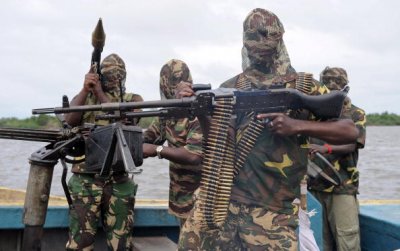
The cloud is gathering again. Trouble appears to have returned once more to the honey pot of the nation. It may yet be the dawn of another season of militancy in the oil rich Niger Delta region of Nigeria. The principal actors this time is a group named the Niger Delta Avengers (NDA) and the Nigerian Army which has resolved to crush it.
Last week, in a sheer display of bravado, the group blew up the Chevron value platform near Warri in Delta State, a very critical facility that links crude oil from Warri Refinery to Kaduna Refinery. The NDA also claimed responsibility for the attack on the Forcados 48 inch Export Terminal about two months ago – a situation which, according to analysts, is capable of depleting the nation’s revenue base by over N 100 billion.
These incidents did not only affect the nation’s oil and gas production. In addition to causing acute shortage of petroleum products, it brought about a sharp decline in power generation across the country. Many power generating and distributing outlets have been left to grapple with extended periods of outages due to paucity of gas supply. As of the last count, four power plants have been reportedly shut down, bringing the total number of power installations not generating any megawatts of electricity to twelve.
Many Nigerians are puzzled about what is making the NDA so daring? The group virtually called the bluff of President Muhammadu Buhari who had vowed to descend on oil and gas pipeline vandals as well as other saboteurs the same way the nation’s Armed Forces were dealing with members of the Boko Haram sect.
The militants even have a number of demands which they insist must be met for peace to return to the Niger Delta. These include the immediate implementation of the report of the National Conference of 2014; the take off of the Maritime University at Okerenkoko; the unconditional release of Nnamdi Kanu, detained leader of the Independent People of Biafra; renewed funding of the Amnesty Scheme; review of allocation formula for oil blocks to reflect fairness to the oil bearing communities and total clean up of the areas affected by oil spillage. The group also made uncomplimentary statements about some prominent politicians such as incumbent Minister of Transportation, Rotimi Amaechi and former governor of Bayelsa State, Timipre Sylva. They also want the Federal Government to apologise to the family of the late governor of Bayelsa State, Diepreye Alamieyeseigha.
On the other side, the Nigerian military has demonstrated their resolve to wage war against the militants with their strong presence in several Niger Delta communities including Oporoza, Delta State which is the home town of Government Ekemupolo (Tompolo), one of the suspected militant leaders.
The situation in the Niger Delta has generated divergent view and comments from many. President of Ijaw Youth Council (IYC), Udengs Eradiri says: “President Buhari should be blamed for anything that is currently happening within the region. He has not come up with an economic plan for the region since his assumption of office.” But the Executive Governor of Delta State, Dr Ifeanyi Okowa sees the attacks on oil pipelines as “Condemnable and criminal.” He notes that the development could have severe consequences on both the nation’s economy and the environment.

President Tinubu Reaffirms Commitment To Defeat Banditry, Terrorism
FG Approves N5bn Relief For Kano Market Fire Victims
El-Rufai Detained By EFCC Over N432bn Probe, Faces Cybercrime Charges
Nigeria Records 31 Deaths From Lassa Fever In Five Weeks — NCDC